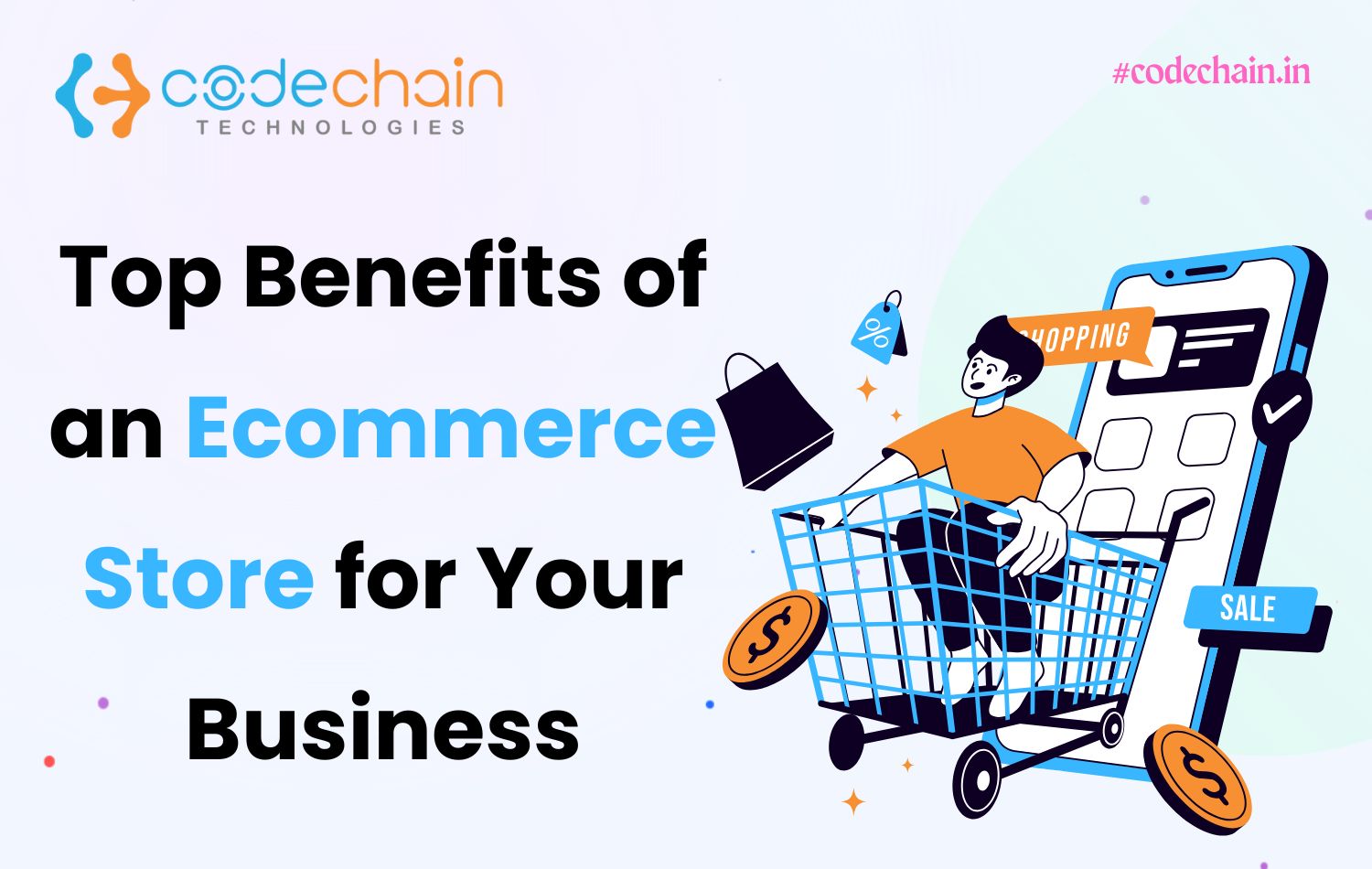
In today’s digital era, businesses are shifting online to meet the growing demand for convenience, variety, and instant access. An eCommerce store allows businesses to reach a broader audience, reduce costs, and increase revenue opportunities. Whether you are a small business, a start-up, or a large enterprise, eCommerce offers advantages that traditional retail cannot match. In this article, we’ll explore the top benefits of having an eCommerce store and why investing in one is crucial for long-term business growth.
Top benefits of having an eCommerce storeGlobal Reach
An eCommerce store allows your business to reach customers worldwide, removing geographical limitations. Unlike physical stores restricted to local footfall, online stores open doors to international markets. This helps businesses scale quickly and compete with larger competitors without opening multiple locations. Global reach also diversifies the customer base, reducing dependency on a single market. With proper digital marketing and logistics support, even small businesses can expand internationally. The ability to serve customers anywhere increases brand recognition, sales potential, and long-term growth opportunities.
Lower Operational Costs
Traditional retail involves high overheads, including rent, utilities, staff salaries, and maintenance. eCommerce significantly reduces these expenses, making it cost-efficient. Automation tools manage billing, inventory tracking, and customer support, reducing manpower requirements. Digital marketing is cheaper and more precise than traditional methods like print or TV ads. Lower operational costs allow businesses to reinvest in product development, marketing, or technology. By saving on unnecessary expenses, eCommerce helps maintain higher profit margins, making it an ideal solution for startups and small businesses looking to scale efficiently.
24/7 Availability
Unlike physical stores with fixed hours, an eCommerce store operates round-the-clock. Customers can shop anytime—during nights, weekends, or holidays—without restrictions. This constant availability increases sales opportunities, improves customer convenience, and builds loyalty. Businesses don’t miss potential sales due to time limitations. Additionally, 24/7 access allows customers from different time zones to interact with your brand. Offering continuous access strengthens trust, encourages repeat purchases, and ensures your business captures the maximum number of potential buyers, enhancing revenue consistently.
Convenience for Customers
Ecommerce provides unmatched convenience. Shoppers can browse products, compare prices, read reviews, and place orders from the comfort of their homes or mobile devices. There’s no need for travel, waiting in lines, or adhering to store timings. Customers can shop anytime and anywhere, making the experience seamless. This convenience encourages repeat purchases, enhances customer satisfaction, and improves brand loyalty. Businesses offering convenience stand out in a competitive market. By prioritizing customer ease, eCommerce stores create a better shopping experience that encourages long-term engagement and loyalty.
Better Customer Insights
Ecommerce platforms provide valuable analytics on customer behavior, purchase patterns, and preferences. You can track popular products, time spent on pages, and abandoned carts. This data helps businesses make informed decisions about inventory, marketing, and promotions. Insights allow for targeted campaigns, personalized recommendations, and better customer service. Understanding customers’ needs improves engagement, conversion rates, and satisfaction. Traditional retail lacks such detailed tracking. With data-driven strategies, eCommerce businesses can optimize performance, reduce errors, and make strategic decisions that maximize growth and profitability.
Scalability
Scaling a physical store requires significant investment in space, staff, and resources. eCommerce allows businesses to expand easily without such constraints. You can add new products, serve new regions, or handle higher traffic volumes with minimal additional costs. Online platforms provide the flexibility to grow step-by-step based on demand. As the business grows, eCommerce stores can handle larger order volumes, integrate new features, and adapt to customer needs seamlessly. This scalability ensures long-term growth and allows businesses of any size to compete effectively in a global market.
Wider Product Range
Unlike physical stores with limited shelf space, eCommerce platforms can showcase unlimited products. Detailed descriptions, images, videos, and specifications help customers make informed decisions. Seasonal, niche, or specialty products can easily find an audience online. Offering a wide range attracts more customers, increases cross-selling opportunities, and boosts revenue. A diverse catalog allows businesses to serve different market segments efficiently. By providing customers with variety and choice, eCommerce stores enhance satisfaction, build loyalty, and stand out from competitors.
Personalized Shopping Experience
Ecommerce platforms allow personalized shopping experiences using AI and customer data. Businesses can recommend products based on browsing history, preferences, and past purchases. Personalized emails, offers, and discounts enhance engagement and encourage repeat purchases. Customers feel valued when shopping experiences are tailored to their needs. Personalization increases conversion rates, reduces decision fatigue, and strengthens loyalty. By offering customized experiences, eCommerce stores improve user satisfaction and differentiate themselves from competitors, creating stronger, long-term customer relationships.
Faster Buying Process
Online shopping is faster and more convenient than traditional retail. Customers can search, compare, and purchase products in minutes. Secure payment gateways simplify transactions, while saved information streamlines repeat purchases. Faster checkout reduces cart abandonment and encourages impulse buying. The efficiency of the buying process improves customer satisfaction and increases sales. A smooth, fast shopping experience ensures that customers enjoy convenience while businesses benefit from higher turnover and better revenue generation.
Multiple Payment Options
Ecommerce stores provide diverse payment methods, including debit/credit cards, UPI, digital wallets, net banking, and Buy Now Pay Later (BNPL). Multiple options increase trust and cater to customer preferences, making transactions seamless. Flexible payment methods reduce purchase barriers, enhance satisfaction, and improve conversion rates. Customers are more likely to complete purchases when they have choices, leading to higher revenue. Offering secure and varied payment solutions is critical for a successful eCommerce business and contributes to a professional brand image.
Improved Brand Awareness
Online stores boost brand visibility significantly. With proper SEO strategies, your website can rank on search engines and attract organic traffic. Content marketing, social media campaigns, and digital ads further enhance recognition. Unlike physical stores limited by location, eCommerce allows your brand to reach a global audience. Increased brand awareness builds trust and credibility, attracts new customers, and encourages loyalty. Over time, strong online presence contributes to consistent growth, better engagement, and higher revenue, making brand visibility a key benefit of eCommerce.
Reduced Geographical Barriers
Ecommerce eliminates location constraints. Even small businesses can sell products to customers in different cities or countries. Reliable logistics and shipping services ensure timely delivery worldwide. By removing geographical limitations, businesses can tap into larger markets, diversify their audience, and reduce reliance on local sales. Online platforms enable easy expansion without heavy investment in multiple locations. Reaching broader markets enhances competitiveness and ensures sustainable growth by connecting your products to audiences who would be unreachable through physical stores.
Streamlined Inventory Management
Managing inventory manually can be challenging and prone to errors. eCommerce platforms include integrated inventory management tools that track stock, generate alerts, and update availability in real time. This prevents over-selling, stockouts, and lost sales. Automated systems sync with suppliers and warehouses, ensuring smooth operations. Streamlined inventory improves operational efficiency, reduces costs, and enhances customer satisfaction by ensuring products are available when needed. Businesses can make better stock decisions, plan replenishment accurately, and avoid unnecessary losses with online inventory tools.
Easy to Start and Manage
Starting a traditional retail store requires significant investment and operational knowledge. eCommerce platforms such as Shopify, WooCommerce, and Magento simplify the process. They provide built-in tools for payment, inventory, and customer management. Even businesses without technical expertise can launch online stores quickly. Cloud hosting ensures stability, while plugins allow customization. Easy setup and management enable entrepreneurs to focus on marketing and growth instead of logistics, making eCommerce accessible for startups and small businesses looking to establish an online presence efficiently.
Increased Customer Retention
Ecommerce provides tools to engage customers post-purchase. Loyalty programs, personalized offers, email campaigns, and push notifications encourage repeat purchases. Retaining existing customers is more cost-effective than acquiring new ones. Engaged customers are more likely to return and recommend your business to others. Consistent engagement improves brand loyalty, strengthens trust, and ensures long-term revenue growth. By leveraging retention strategies, businesses can maximize lifetime value and foster sustainable growth with their eCommerce store.
Cost-Effective Expansion
Expanding a physical store requires major investment in space, staff, and logistics. eCommerce allows businesses to enter new markets at minimal cost. Adding new products or targeting different audiences is faster and more economical online. Digital campaigns can be tailored for specific regions without additional overheads. Cost-effective expansion helps businesses grow strategically, test new ideas, and reach more customers without financial strain. Online expansion enables gradual scaling, reducing risks associated with traditional retail growth.
Mobile Commerce Growth
With the majority of shoppers using smartphones, mobile commerce is a key advantage. Ecommerce websites are mobile-responsive, and dedicated apps enhance the user experience. Mobile shopping allows customers to browse and purchase anytime, anywhere. Features like push notifications, in-app offers, and quick payments boost engagement. Businesses tapping into mobile commerce reach a broader audience and increase conversion rates. Ignoring mobile shoppers can mean missing out on one of the fastest-growing segments of online retail.
Automation Possibilities
Ecommerce platforms support automation for various operations, such as order confirmations, shipping notifications, abandoned cart reminders, and email campaigns. Marketing automation enables personalized offers, upselling, and segmentation without manual effort. Automation reduces errors, saves time, and ensures consistent communication with customers. Businesses can focus on strategy and expansion while routine tasks are managed automatically. Efficient automation improves customer experience and streamlines operations, contributing to overall growth.
Enhanced Customer Support
Ecommerce stores can provide instant customer support through chatbots, FAQs, and live chat. Customers can resolve issues quickly without visiting a physical store. Online support improves satisfaction and builds trust. Automated ticketing systems and AI-powered assistants make handling queries more efficient. High-quality customer support leads to positive reviews, better retention, and improved brand reputation. With digital tools, businesses can ensure customer issues are resolved promptly and efficiently, creating a seamless shopping experience.
Long-Term Business Growth
An eCommerce store future-proofs your business. As online shopping grows, businesses with a strong online presence continue to expand. eCommerce enables scaling, analytics-driven decisions, and access to global markets. Automation, personalization, and mobile commerce enhance growth potential. By investing in eCommerce, businesses ensure they remain competitive, adaptable, and prepared for evolving consumer behavior. Long-term growth is supported by reduced operational costs, better customer engagement, and increased brand visibility, making eCommerce a cornerstone of sustainable business success.
FAQs
Q1: Is an eCommerce store suitable for small businesses?
A1: Yes, it reduces costs, expands reach, and provides tools for growth, making it ideal for small businesses.
Q2: How much does it cost to set up an eCommerce store?
A2: Costs vary based on platform, features, and customization; platforms like Shopify and Woo Commerce offer affordable options.
Q3: Can I sell internationally with an eCommerce store?
A3: Yes, reliable shipping and logistics allow global sales, removing geographical limitations.
Q4: Do I need technical knowledge to manage an eCommerce store?
A4: Basic knowledge helps, but platforms are user-friendly, and agencies like CodeChain can handle technical aspects.
Q5: How does eCommerce improve customer retention?
A5: Tools like loyalty programs, personalized offers, and notifications encourage repeat purchases and engagement.
Q6: Can I integrate multiple payment methods?
A6: Yes, eCommerce platforms support cards, digital wallets, net banking, and Buy Now Pay Later options.
Q7: How does SEO help my eCommerce store?
A7: SEO improves search rankings, attracts organic traffic, and increases potential customers.
Q8: Is eCommerce suitable for niche or small product lines?
A8: Yes, online stores allow showcasing niche products without the space limitations of physical stores.
Q9: Can an eCommerce store work offline?
A9: Certain apps can provide offline access to product catalogs, but transactions require internet connectivity.
Q10: Why choose CodeChain for eCommerce development?
A10: CodeChain offers custom, scalable eCommerce solutions with features like SEO, automation, and app integration.
